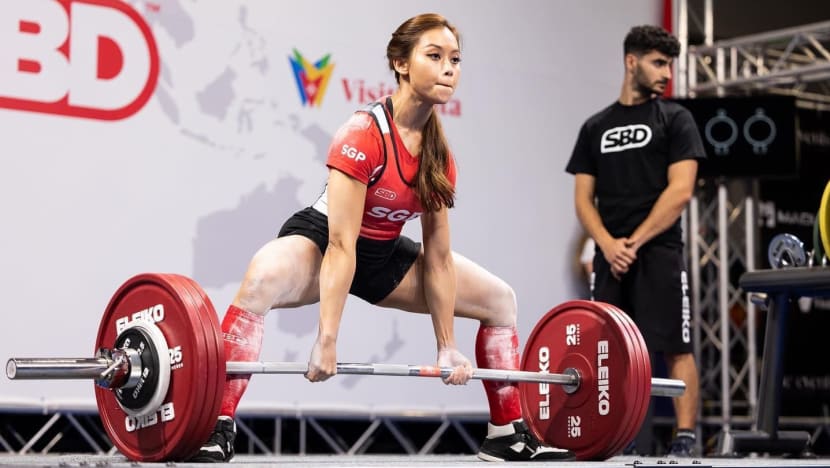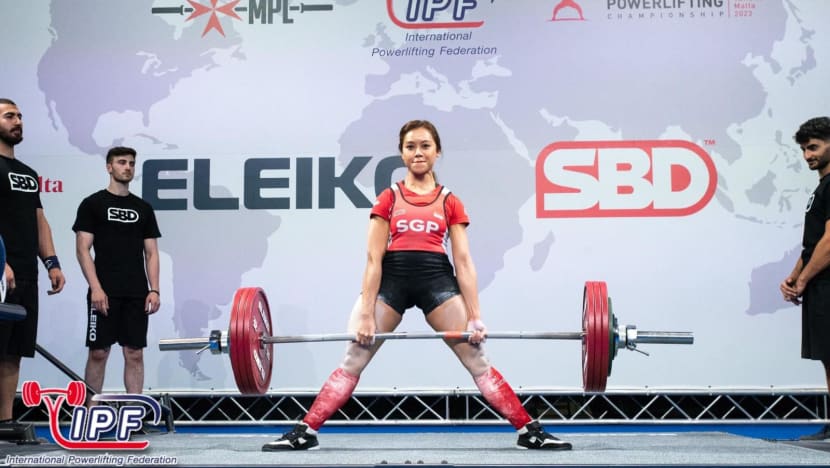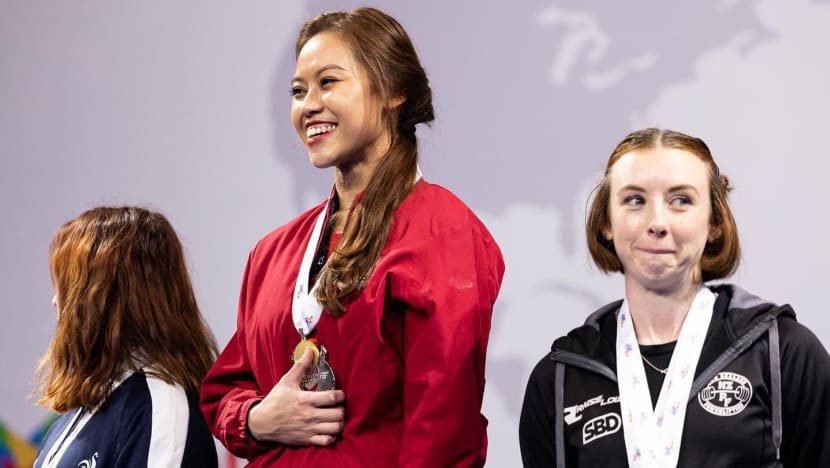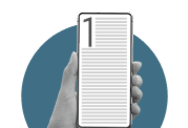Singapore powerlifter and world record holder Farhanna Farid hopes to inspire others to be themselves
Farhanna Farid earlier this month set a world record in the women’s Under-52kg deadlift – her sixth deadlift record in a year.

Farhanna Farid at the World Open Classic Powerlifting Championships in Malta. (Photo: Facebook/SBD Singapore)
SINGAPORE: It was in secondary school when Farhanna Farid first realised she was a little different.
“I was very goofy," she told CNA. "I just didn't feel like I needed to be like the other girls ... prim and proper. Activities they liked to do was not something that I very much liked to do.”
And it was suffocating at times, because Farhanna felt she had to do certain things to fit in.
“I felt like I always had this unbridled, unfulfilled potential and I didn't know what it was,” said the Singaporean, who earlier this month set a new world record in the women’s Under-52kg deadlift.
Her 203kg effort, set at the World Open Classic Powerlifting Championships in Malta, was her sixth deadlift world record in the span of a year.
Staying “within the lines” didn’t bring much joy and Farhanna poured her energy into various hobbies.
“I tried to do everything ... I was a jack of all trades, but master of none.”
Until she discovered powerlifting.
It was a “series of unfortunate events” that led her to the sport. An avid runner during her university days, Farhanna started to experience niggling injuries.
“I just kind of kept pushing through and then I suddenly hit a wall … Basically, me running was doing more harm than any good.”
But she still had all that pent-up energy. So she decided to hit the gym with her boyfriend, now husband, James Barcelo.
“He’s a gym rat. All our dates and everything would centre around his gym sessions,” she said. "I wanted to see what it was about.”
She was anything but a natural when starting out. “The first time I stepped into the gym, it was super awkward,” she recalled. “The racks, the bars and the plates were just so intimidating. If not for my partner kind of forcing me to shadow him or him teaching me the ropes, I don't think I would have gone there myself.”
Deadlifting was what she took to “most naturally” and the turning point came in 2017, during a friendly competition with some guys in the gym.
“I was training with them but I was not formally trained in powerlifting. And I happened to pull above the national record.
“Back then I didn't know exactly what that meant, I didn't know what powerlifting was. I didn't know what (the) national record was. It was a bit mind-boggling.”Farhanna signed up for her first competition in 2018, won it, and the rest is history.

"Powerlifting was my way of finding my own voice and doing my own thing and going against my own very grain," she said.
"When I went to watch these competitions, there were all these small, petite women going out there and showing their prowess. They're so strong in their own right, because we compete within our body weight categories, within our age category. It's about being strong within your own right and I very much appreciated that."
While her loved ones are a source of support for Farhanna in her powerlifting journey, there was naturally more concern than support in the beginning, she revealed.
"My mum was concerned that I could hurt myself," she said. There were questions about how weightlifting could affect her in the long term, including whether she would be able to have children.
But her family all turned up for her first competition.
When they saw how much she loved it, "they finally got it". And this acceptance slowly shifted to support, Farhanna said.
Today, her father sends Farhanna off to the airport when she travels for competitions and picks her up when she returns. Her mother prepares her food when she needs to cut weight for competitions.
"NOTHING I'VE EVER EXPERIENCED"
Going into the competition in Malta, Farhanna's existing world record of 202kg set last December had been eclipsed by New Zealand's Evie Corrigan (202.5kg) earlier this year. This provided "good motivation" for the 30-year-old.
"I thought it was good that someone took the record because I felt even more compelled to do it," she said. "I would want to defend my title and record as much as possible, but someone should be kind of nipping me on my tail, to constantly keep me going."
To complicate things, Farhanna was battling a major back injury, which she suffered about two months before the competition.
"I was getting this shooting pain through my left back, from my tailbone upwards. I couldn't lift my leg, I couldn't breathe, I couldn't sneeze without shooting pain," she said.
"It was basically nothing that I have ever encountered before. It was uncharted territory. I was going into competition, I was prepping, not knowing how my body will hold up."
And it was a "humbling" time, Farhanna said.
"Going through that period, it was hard to see that I could come out of it."
While the injury kept her away from the gym for about two weeks, with the help of a physiotherapist and her support team, Farhanna made it to the platform in Malta.
Her body was barely holding up, she recalled. But she regained the record.
"This was the most daunting competition that I was prepping for," she said. "I think this record kind of showed my mental resilience or its capacity of how far I can push myself not just physically but mentally as well.
"I would have loved to push for more, but given the circumstances, the fact that we managed to pull off a record was a big relief for me."

"A SCIENCE AND AN ART"
Rather than just the exerting of brute force, powerlifting is both a science and an art, said Farhanna.
Powerlifting consists of three disciplines – the squat, the bench press and the deadlift.
"It feels like a choreographed move because everything has timing, it needs coordination at the same time. And you cannot just … heave it up (the barbell and weight up) because then you can only get so far," she said.
"For you to be able to do powerlifting, you need to fully understand your body, understand your leverages and how you can use it to your own benefit."
Once a pharmacist, Farhanna now competes and coaches full-time. She now also coaches her husband, and says they have come "full circle".
She hopes to continue to push herself to break boundaries.
"I've learned that you cannot appease everyone, and this is your own life to lead. If you're constantly trying to make everyone happy, you constantly feel the need or obligation to explain yourself – it's gonna be a very exhausting life to lead."
It is okay to be different, she added.
"Instead of just kind of fitting yourself into that cookie-cutter mould, just embrace your weirdness, your oddness," Farhanna said. “You be you."
Her message to others is also that they can do what they set their minds to do.
"The capacity of our human body, our human mind is endless. It's a matter of you making that conscious decision of wanting to pursue something. If you commit to it, no one else can deny you of it and you can very much go very far with it," she said.
"Especially in Singapore as women, we have all these expectations and boundaries kind of put on us so I just want to show them ... There are more ways of doing things, there are way more things out there for us. Opportunities are endless, and it's a matter of you wanting to do it."


















